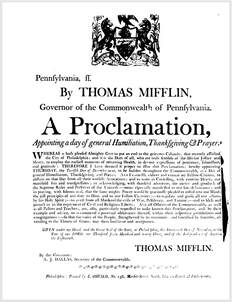|
Thanksgiving as a holiday may be gone, but thanksgiving as a practice is not. At least from a Biblical perspective, it isn’t. When considering Biblical thankfulness, you can’t separate it from another key Biblical concept – grace. The New Testament Greek word for “thanks” literally means “good grace,” so anytime you read the word “thanks,” you can substitute the phrase “recognize God’s good grace.” In saying thanks, we’re acknowledging that all we have comes from God’s generous stores of grace. This connection between thanks and grace is deeply embedded in our language and idioms. Did you ever wonder why we “say grace” before a meal? Did you ever wonder about the root of the word “gratitude?” (It is grace.) Or, in Spanish why the word for “thanks” is “gracias,” and in Italian, it is “grazie?”  Unfortunately, many of God’s good graces go un-thanked. In Luke 17, we read the account of when Jesus was met by a group of ten lepers. In verse 12 we’re told that they recognized Jesus and called out loudly asking him to heal their terrible disease. Jesus heard their cry and sent them to the priest, who was the one to declare them free from leprosy. Along the way, they recognized that they were healed. Not one was excluded from this act of God’s grace. But what happens—or rather what doesn’t happen—next is astounding. Of the ten who were healed, nine neglected to thank Jesus. Only one of the newly healed returned to loudly acknowledge Christ’s good grace in healing him. It seems the other nine fell into a familiar trap. We loudly call out for help, but when it comes to acknowledging where our help has come from, we’re not so loud. There’s plenty of energy to ask for help and not so much to humbly acknowledge where that help comes from. Why do we not abound in genuine thankfulness as Colossians 2:7 directs us? I think there are several potential reasons.
So, where can we look for positive examples of thankfulness that reflect the Biblical understanding? One place we might not think to look would be our government leaders. Humbly acknowledging God’s good grace is something our leaders do not often do in public. But with some digging, I found a profound example of thankfulness for healing from a governor of Pennsylvania. Of course, I had to dig back 229 years to find it. In November of 1793, the city of Philadelphia was just recovering from a terrible plague of yellow fever. Through the summer and fall, 10% of the city’s population died from the highly communicable disease. However, an early cold snap brought an abrupt reversal to the death rates as standing water throughout the city froze and stopped the propagation of the mosquitos that spread the illness. As the plague abated, the governor, Thomas Mifflin, called for a Day of Humiliation, Thanksgiving, and Prayer on December 12, 1793. This is no lightweight, politically correct declaration of non-specific “thoughts and prayers for the victims.” It’s more like a theological mini-treatise on thankfulness.  Since the declaration is hard to read with its 18th-century language, I have rewritten it in contemporary English to make it more accessible. I’m offering it here without further comment but commending it to all our consciences as a model of Biblical thankfulness we can use every day as we acknowledge God’s good grace. ************************ Because it pleased God Almighty to end the terrible sickness that recently devastated the city of Philadelphia and, Because everyone who understands God’s justice and mercy should use the very first moments of their restored health to express submission to God and thanks for healing, I have therefore decided that it is fitting to make this Proclamation, which makes Thursday, December 12, 1793 a day of repentance, thanksgiving, and prayer. I seriously urge my fellow citizens to stop with their normal lives for a day to unite with others in confessing our sins with humble hearts while gratefully recognizing the mercy and goodness of the Supreme Ruler and Preserver of the Universe, which he has shown us by ending the plague. I urge you to pray with real passion that the same incredible power of God would 1. Transform our minds to understand our obligation to him and to others, 2. Guide us by his Holy Spirit, 3. Prevent among us wars, pandemics, and famine, and 4. Bless and protect our ability to live in civil and religious freedom. All officials in the State, along with Pastors and Teachers are asked to let everyone know about this proclamation and by their EXAMPLE and ADVICE to recommend prompt obedience to this proclamation in their spheres of authority, so that the voice of the people in repentance, thanks, and praise, strengthened by speaking as one and sanctified by our sincerity, ascending to the throne of grace, may in God find favor and acceptance. ************************ Comments are closed.
|
Cultivating godly influencersWilmington Christian School provides a distinctively Christian, innovative education that effectively develops Godly influencers who are well prepared for life after high school and who impact the culture for Christ. Archives
May 2024
Categories
All
|
|
Wilmington Christian School provides a distinctively Christian, innovative education that effectively develops Godly influencers who are well prepared for life after high school and who impact the culture for Christ.
Wilmington Christian School admits students of any race, color, national and ethnic origin to all the rights, privileges, programs, and activities generally accorded or made available to students at the school. It does not discriminate on the basis of race, color, national and ethnic origin in administration of its educational policies, admissions policies, scholarship and loan programs, and athletic and other school-administered programs. |
|
|
© Copyright Wilmington Christian School. All Rights Reserved.
Website designed by PROSPER Creative Design
Website designed by PROSPER Creative Design


